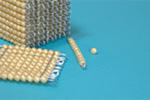The Montessori Preschool Program

The Montessori Preschool Program accepts students from 3 years of age through kindergarten. Half-day (9:00 AM - 12:00 PM) and full day (9:00 AM - 3:00 PM) classes are available for three or five day enrollment. The three day program is limited to 3 year old students only. Children turning 4 prior to September 1 are expected to attend five days in order for them to meet the criteria for kindergarten the following year. These multi-aged classes allow children to work with the Montessori materials following an individualized curriculum geared to their interests and developmental stage. In addition, weekly Spanish and Music classes are offered for students.
The early childhood Montessori environment for children aged 3 to 6 is designed to work with the interests and tendencies of children at this stage of their development. Learning that takes place during these years comes spontaneously without effort, leading children to develop a clear, concrete sense of many abstract concepts. Montessori helps children to become self-motivated, self-disciplined, and to retain a sense of curiosity. Children act with care and respect toward their environment and each other. They are able to work at their own pace and ability and are able to enjoy their own accomplishments rather than compare themselves with others in the class. The three-year Montessori experience tends to nurture a joy of learning that prepares the child for further challenges.
Montessori Community School of Newtown conducts two morning preschool classes. The Montessori classroom is a miniature community in which the children live and work cooperatively.. As older children help younger, they reinforce their own learning. The adult in the classroom is primarily an observer. She is also the connecting link between the children and the materials, giving large group, small group and individual lessons.
There are five primary areas of a Montessori classroom. The area that contains Practical Life exercises lays the foundation for all the other materials in the classroom. The purposes of these daily living tasks are to develop the senses of order, concentration, coordination and independence.
The Sensorial area in the classroom allows children to explore, develop and refine the five senses. The materials provide a guide to observation and classify the impressions that each sense can receive.
Language is an important component of the entire curriculum. The environment includes provisions for developing basic reading skills, introducing reading as a tool, fostering reading interest in appropriate literature and encouraging life-long reading habits.
The Mathematics area of the classroom involves concrete manipulative materials and symbolic representations for developing skills and internalizing concepts. All materials have a built-in control of error, which enables the child to see mistakes for himself rather than be corrected by a teacher.
In addition to these four major areas, the Montessori classroom also includes cultural areas that allow for exploration into science, geography and history.
“To the young child, learning is a natural function of childhood - effortless, challenging, and meaningful.” - Maria Montessori

